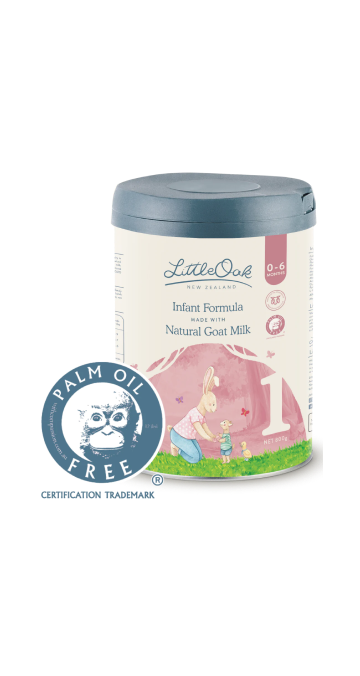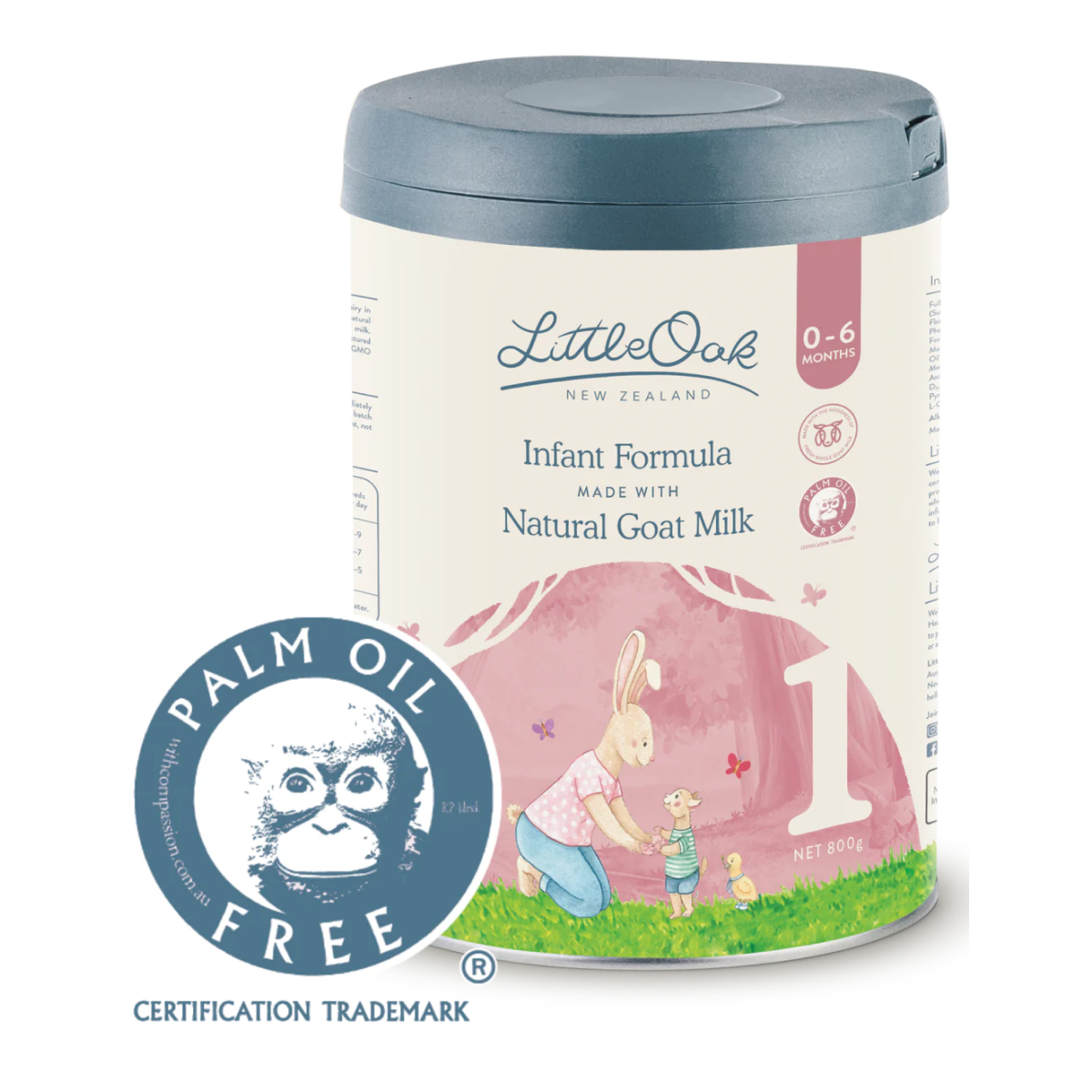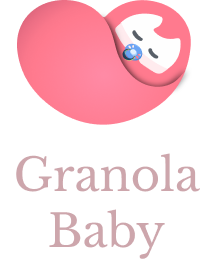
A Guide To Organic Baby Formula
If the word “organic” has you picturing farm-fresh veggies and eco-friendly baby gear, you’re definitely not alone. From diapers to creams and even toys, the organic trend has taken the parenting world by storm. But when you’re knee-deep in new parenthood, figuring out if organic baby formula is worth its often higher price tag can feel downright daunting.
Worry not! We’ve got the lowdown on what makes baby formula truly organic, the pros and cons, and some top-notch brands to consider. Keep reading for your ultimate guide to organic baby formula!

LittleOak Organic Baby Formula
- Complete nutrition modeled after breastmilk
- Naturally occurring A2 proteins
- Sourced from grass-fed organic New Zealand goats
- World's first no palm oil formula
What Does Organic Baby Formula Mean?
For the U.S. Department of Agriculture (USDA) to give a food the coveted "organic" label, it has to pass some pretty rigorous checks. We're talking about strict guidelines covering soil quality, how animals are raised, pest and weed control, and even which additives are used. Organic farmers stick to natural substances and go the extra mile with methods that are physical, mechanical, or biologically based. For instance, your organic veggies are labeled as such only if they've been grown in soil free from prohibited substances for at least three years before harvest.
When it comes to baby formula, earning the "certified organic" badge means that at least 95% of the ingredients are organic.
But here’s a comforting nugget: whether your baby formula says "organic" on the tin or not, it has to meet the same stringent FDA nutritional standards before it lands on store shelves. This includes specific required amounts for 29 nutrients and caps for nine of them.
"All formula in the U.S. is tightly regulated by the FDA," assures Dr. Elena Shea, a pediatrician and international board-certified lactation consultant. "Organic or not, you’re getting the same nutrition."
So what exactly does “organic formula” mean? According to Dr. Shea, it means the formula has met higher standards for that certification. This includes being non-GMO, using certified organic ingredients and processing aids, and sticking to the National List of Allowed and Prohibited Substances. This means you’ll find fewer preservatives, flavors, and other additives in organic formulas compared to the standard ones."
Whether you're opting for formula or breastfeeding, Dr. Shea emphasizes, "The most critical thing is the health of both baby and mother. Formula is a great alternative for those who can’t—or choose not to—breastfeed. It will give your baby all the nutrition they need."
Advantages of Using Organic Baby Formula
While all regulated baby formulas nourish your little one effectively, going organic offers some perks, primarily by reducing potential exposure to pesticides and other chemicals, says Dr. Shea.
Nutritionally, organic and non-organic formulas are quite similar, but there are “definitely presumed benefits of organic formula over the standard version, mainly due to reduced exposure to certain chemicals like pesticides,” concurs Caroline Brown, M.D., a pediatrician in Winston-Salem, North Carolina.
“Research has shown that pesticide exposure can impact young children’s cognitive and behavioral development[1],” she highlights. “However, the actual amount of pesticide your baby gets from standard formula is debatable and might not have any significant clinical effects.”
Indeed, it's good to know that the United States Environmental Protection Agency (EPA) ensures all pesticides used on U.S. foods meet strict safety standards set forth by the Food Quality Protection Act. This includes ensuring these pesticides are safe for kids. Plus, the FDA conducts annual checks on pesticide residues.
Navigating the formula aisle can feel like a Herculean task, especially for sleep-deprived parents. So, we’ve done the homework for you! We analyzed the price and nutritional components of over 80 baby formulas to identify the cream of the crop. Product details and prices are accurate as of the publication date.
Disadvantages of Organic Baby Formula
The notorious price tag of organic baby formula. Just like its organic food cousins, it often commands a higher price compared to the conventional stuff.
"The cost is indeed the main downside of organic formula," says Dr. Brown. "But there's also the issue of not paying enough attention to the ingredients. Ideally, savvy parents would read the ingredient labels and understand aspects like sugar content and the best type of protein for their little ones."
A Guide to Selecting the Best Organic Baby Formula
It turns out you're not alone in your quest for the best organic baby formula. A 2020 study has shown that many parents in the U.S. are eyeing organic options from Europe[2]. But here's the catch: these formulas are often sold by third-party vendors and fall outside of the FDA's watchful eye. Yup, you heard that right! Researchers suggest that doctors could use a little extra training on the nuances of these European goodies. And, just so you know, the USDA’s 2020-2025 Dietary Guidelines give a thumbs down to formulas not FDA-regulated.
There are plenty of fantastic formulas bearing the coveted USDA-certified organic seal and are also regulated by the FDA. If you're leaning towards the organic route, check out these standout options:
LittleOak
LittleOak is a superstar in the baby formula universe. Coming from Australia, the company sources their organic goat milk from New Zealand and processes the milk using a natural process that retains the majority of the nutrients without having to add bad ingredients like palm oil.
- Nutrient-Rich: The most important factor in choosing baby formula for my kids is the nutritional aspect. We are a health-conscious family and seeing the organic & natural ingredients used in the formulas put LittleOak at the top of our list.
- The limited options: I liked that LittleOak found a recipe that works for each primary stage of a baby's development. We weren't overloaded with a variety of choices that needed deeper research to go through.
- The great taste: Compared with the other formula brands we tried, our babies loved the taste of LittleOak goat milk. No spitting up ever occurred and our babies were genuinely happy to be drinking the formula.
Bobbie
Bobbie is more than just a name; it's a game-changer in the baby formula market. This USDA-certified organic baby formula is inspired by breast milk and comes in a milk-based powder form with iron.
- Pasture-Raised Goodness: Their organic milk comes from cows that spend 42% more time on pasture than your average USDA requirement. That's a lot of moo-time!
- Brain-Boosting DHA: The DHA omega-3 is sustainably sourced, algae-based, and water-extracted (no hexane in sight!). This fatty acid is like brain food for your little one, supporting brain and eye development.
- Fat That Matters: The organic fat blend is modeled after the average fat profile of breast milk, offering essential fatty acids.
- Easy-Peasy Digestion: It contains whey and casein protein, both known to be easy on tiny tummies.

LittleOak Organic Baby Formula
- Complete nutrition modeled after breastmilk
- Naturally occurring A2 proteins
- Sourced from grass-fed New Zealand goats
- World's first no palm oil formula
Burt’s Bees Baby Organic Formulas: Break out your parenting toolkit because Burt’s Bees has just leveled up with USDA-certified organic baby formulas! Here’s what you need to know:
- Options Galore: Burt’s Bees offers three formula varieties—in**fant, sensitive, and ultra-gentle —tailored to suit your baby’s unique dietary quirks.
- Nutrient-Packed: Each formula is enriched with vitamins D, E, and K, plus calcium and iron for brain, eye, bone, and immune system boosts.
When you're on the hunt for the perfect organic formula, scrutinizing those labels is key! As Dr. Brown points out, “The goal is to mimic breast milk as much as possible. Choosing a formula with more lactose (the carbohydrate found in human milk) is ideal. If your little one has issues with certain proteins, understanding the whey-versus-casein ratio can help manage gas, reflux, and allergies.”
And if all those ingredients make your head spin, don’t hesitate to consult your pediatrician for guidance!
Is Organic Baby Formula the Right Choice for Your Baby?
If you're feeling a bit lost in the baby formula aisle, have a chat with your pediatrician or an infant nutrition specialist—they're here to help.
Worried about breaking the bank? Generic formulas might be your new best friend. Dr. Shea explains, “Generic formulas are often made in the same factories as brand-name ones,” which means you’re getting similar quality without the high price tag. Talk about a win-win!
And here's a little pep talk from Dr. Shea: Every parenting journey is as unique as your little one's adorable giggles. Don’t sweat it if your path doesn't look like what you see online or even what your friends are doing. Whether you're using breast milk, formula, or a mix of both, go ahead and give yourself a pat on the back. You’re doing an amazing job nourishing your baby!

Our #1 pick for the most nutritious infant formula
LittleOak products are designed to meet the dietary needs of growing little ones. It is made with fresh whole goat milk straight from dairy in New Zealand.
